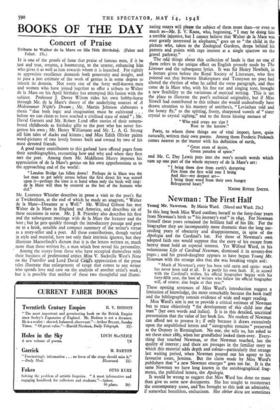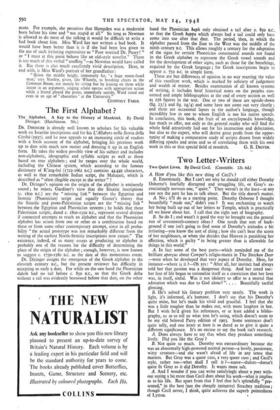Newman : The First Half
Young Mr. Newman. By Maisie Ward. (Sheed and Ward. 21s.) IN this long book Miss Ward confines herself to the forty-four years from Newman's birth to "his journey's end" in 1845. For Newman himself these years remained the brilliant half of his life. For the biographer they are incomparably more dramatic than the long suc- ceeding years of obscurity and disappointment, in spite of the Apologia and the Cardinal's hat. For those of Newman's own adopted faith one would suppose that the story of his escape from heresy must hold an especial interest. Yet Wilfred Ward, in his voluminous Life of Cardinal Newman, dismissed it in seventy-five pages ; and his grand-daughter appears to have begun Young Mr. Newman with the strange idea that she was breaking virgin soil: "Much of Newman's story has been told again and again: much
has never been told at all. It is partly his own fault. If, in accord with the Cardinal's wishes, his official biographer begins with his forty-fifth year, the host of writers who follow the official biographer will, of course, also begin at that year."
These opening sentences of Miss Ward's introduction suggest a limitation of knowledge, the more remarkable because the book itself and the bibliography contain evidence of wide and eager reading.
Miss Ward's aim is not to provide a critical estimate of Newman but to trace objectively " the development of this child into that man" (her own words and italics). It is in this detailed, uncritical presentation that the value of her book lies. No student of Newman can afford not to possess it ; if only because it draws extensively upon the unpublished letters and " autographic remains " preserved at the Oratory in Birmingham. No one, she tells us, has asked to see these since 1885, when her grandfather looked them over. Every- thing that touched Newman, or that Newman touched, has the quality of interest ; and there are passages in the familiar story to which this material adds depth and colour—particularly that strange last waiting period, when Newman poured out his agony to his favourite sister, Jemima. But the claim made by Miss Ward's publishers that "a new Newman emerges" goes too far. It is the same Newman we have long known in the autobiographical frag- ments, the published letters, the Apologia.
It would be wrong to suggest that Miss Ward has done no more than give us some new documents. She has sought to reconstruct the contemporary scene, and 'has brought to this task an admirable, if somewhat breathless, enthusiasm. Her obiter dicta are sometimes
acute. For example, she perceives that Hampden was a modernist born before his time and " not stupid at all." So long as Newman is allowed to do most of the talking it would be difficult tO write a bad book about him. Miss Ward has not written a bad book. It would have been better than it is if she had been less given to the use of such irritating expressions as "Poor worried Dr. Pusey! " or " I must at this point behave like an old-style novelist." There is too much of this verbal " snuffing "—as Newman would have called it. But there is also much excellently vivid description. Here, to end with, is Miss Ward's portrait of her grandfather: " Below the middle height, immensely fat, ' a huge moon-faced man,' says Stanley, given, like Whately, to breaking chairs in the
Common Room, not merely by sitting but by leaning on them while intent in an argument, singing whole operas with appropriate action while a friend played the piano, immensely untidy, Ward stood out even in an age of ' characters ' at the University."
GEOFFREY FABER.































 Previous page
Previous page